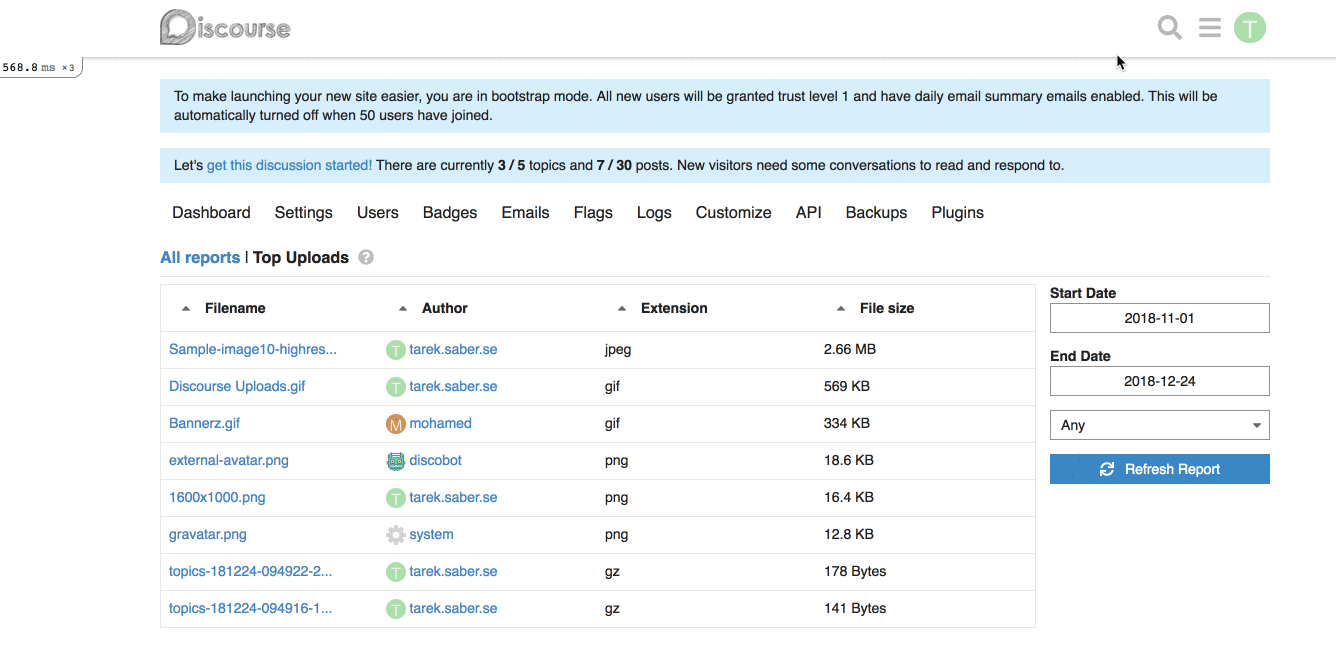Includes support for flags, reviewable users and queued posts, with REST API
backwards compatibility.
Co-Authored-By: romanrizzi <romanalejandro@gmail.com>
Co-Authored-By: jjaffeux <j.jaffeux@gmail.com>
- The test_email job is removed, because it was always being run synchronously (not in sidekiq)
- 34b29f62 added a bypass for critical emails, to match the spec. This removes the bypass, and removes the spec.
- This adapts the specs for 72ffabf6, so that they check for emails being sent
- This reimplements c2797921, allowing test emails to be sent even when emails are disabled
* FEATURE: Exposing a way to add a generic report filter
## Why do we need this change?
Part of the work discussed [here](https://meta.discourse.org/t/gain-understanding-of-file-uploads-usage/104994), and implemented a first spike [here](https://github.com/discourse/discourse/pull/6809), I am trying to expose a single generic filter selector per report.
## How does this work?
We basically expose a simple, single generic filter that is computed and displayed based on backend values passed into the report.
This would be a simple contract between the frontend and the backend.
**Backend changes:** we simply need to return a list of dropdown / select options, and enable the report's newly introduced `custom_filtering` property.
For example, for our [Top Uploads](https://github.com/discourse/discourse/pull/6809/files#diff-3f97cbb8726f3310e0b0c386dbe89e22R1423) report, it can look like this on the backend:
```ruby
report.custom_filtering = true
report.custom_filter_options = [{ id: "any", name: "Any" }, { id: "jpg", name: "JPEG" } ]
```
In our javascript report HTTP call, it will look like:
```js
{
"custom_filtering": true,
"custom_filter_options": [
{
"id": "any",
"name": "Any"
},
{
"id": "jpg",
"name": "JPG"
}
]
}
```
**Frontend changes:** We introduced a generic `filter` param and a `combo-box` which hooks up into the existing framework for fetching a report.
This works alright, with the limitation of being a single custom filter per report. If we wanted to add, for an instance a `filesize filter`, this will not work for us. _I went through with this approach because it is hard to predict and build abstractions for requirements or problems we don't have yet, or might not have._
## How does it look like?

## More on the bigger picture
The major concern here I have is the solution I introduced might serve the `think small` version of the reporting work, but I don't think it serves the `think big`, I will try to shed some light into why.
Within the current design, It is hard to maintain QueryParams for dynamically generated params (based on the idea of introducing more than one custom filter per report).
To allow ourselves to have more than one generic filter, we will need to:
a. Use the Route's model to retrieve the report's payload (we are now dependent on changes of the QueryParams via computed properties)
b. After retrieving the payload, we can use the `setupController` to define our dynamic QueryParams based on the custom filters definitions we received from the backend
c. Load a custom filter specific Ember component based on the definitions we received from the backend
Previously it would unhide their post but leave them silenced.
This fix also cleans up some of the helper classes to make it easier
to pass extra data to the silencing code (for example, a link to the
post that caused the user to be silenced.)
This patch also refactors the auto_silence specs to avoid using
stubs.
Currently the theme is matched by name, which can be fragile when there are many themes with the same name. This functionality will be used by the next version of theme CLI.
- Themes can supply translation files in a format like `/locales/{locale}.yml`. These files should be valid YAML, with a single top level key equal to the locale being defined. For now these can only be defined using the `discourse_theme` CLI, importing a `.tar.gz`, or from a GIT repository.
- Fallback is handled on a global level (if the locale is not defined in the theme), as well as on individual keys (if some keys are missing from the selected interface language).
- Administrators can override individual keys on a per-theme basis in the /admin/customize/themes user interface.
- Theme developers should access defined translations using the new theme prefix variables:
JavaScript: `I18n.t(themePrefix("my_translation_key"))`
Handlebars: `{{theme-i18n "my_translation_key"}}` or `{{i18n (theme-prefix "my_translation_key")}}`
- To design for backwards compatibility, theme developers can check for the presence of the `themePrefix` variable in JavaScript
- As part of this, the old `{{themeSetting.setting_name}}` syntax is deprecated in favour of `{{theme-setting "setting_name"}}`
This makes more sense than having the guardian take an accessor.
The logic belongs in the Serializer, where the JSON is calculated.
Also removed some of the DRYness in the spec. It's fewer lines
and made it easier to test the option on the serializer.
* Dashboard doesn't timeout anymore when Amazon S3 is used for backups
* Storage stats are now a proper report with the same caching rules
* Changing the backup_location, s3_backup_bucket or creating and deleting backups removes the report from the cache
* It shows the number of backups and the backup location
* It shows the used space for the correct backup location instead of always showing used space on local storage
* It shows the date of the last backup as relative date